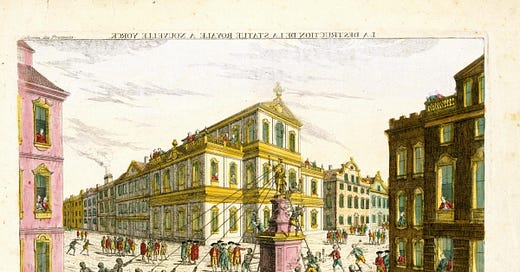TWIH: Oliver Wolcott, Signer of the Declaration
This signer—Oliver Wolcott—didn’t vote for the Declaration, but he signed anyway. What happened to his vote? Remember, his signature made him a traitor in the eyes of the King.
At about this time in 1797, a signer of the Declaration of Independence passes away. You might be surprised to hear that this signer—Oliver Wolcott—didn’t vote for the Declaration.
He couldn’t! He wasn’t present for the official vote in Philadelphia. Why not? And how did he get his name on the document if he wasn’t even there?
Wolcott was born to a respected family in Connecticut. He graduated from Yale, but he went directly into military service after college. He served in King George’s War as a militia captain. He then studied medicine for a time, but eventually became sheriff of his county instead. He was a judge for a while, and he sat in the state’s legislature.
As America began its break from England, he was a natural candidate for the Continental Cοngress.
Wolcott was not the most active member of Cοngress. He was torn between two duties: Not only was he a delegate, but he was also a military man. He was present for early debates on the Declaration during the summer of 1776, but he soon left Philadelphia because of illness. Once recovered, he did not return to Cοngress, but he was instead appointed to take several regiments to help defend New York. He was present at the Battle of Long Island in August 1776.
He thus wasn’t present when Cοngress voted for independence in July 1776, but he would later put his name on that document, along with his fellow delegates.
Perhaps he had effectively voted for the Declaration with his actions, as he served with Washington’s army?
An interesting event occurred in New York that summer. When George Washington received the Declaration of Independence, he had it read to the troops assembled there. Much to General Washington’s chagrin, his troops responded by tearing down a statue of King George III.
Washington appreciated the “Zeal in the public cause,” but he regretted the “appearance of riot, and want of order, in the Army.”
Nevertheless, Wolcott ensured that the leaden statue was put to good use. He reportedly had pieces of the statue transferred to his home in Connecticut. Once there, his wife, children, and neighbors melted the statue down into thousands of bullets.
Following the war, Wolcott served in the state legislature. He negotiated treaties with Indian tribes. He was a member of the Connecticut ratifying convention that approved the Constitution. He was lieutenant governor, then governor, of his state.
He died during his term as governor, yet another Founder who is mostly forgotten today—but he spent most of his adult life serving his state, his country and the Patriot cause.
Maybe today is a good day to remember another nearly forgotten hero.
Sources can always be found on my website, here.





Thank you for this enlightening piece. I never heard of Oliver Wolcott. He was serving quietly in the background. Why is it that many true heroes do not seek the limelight? It just seems to be a character trait. One to be admired.
Your posts are excellent history lessons.....